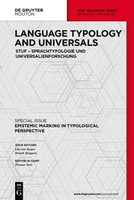
STUF-Language Typology and Universals
Scope & Guideline
Illuminating the Rich Tapestry of Global Languages
Introduction
Aims and Scopes
- Typological Studies:
A primary aim of the journal is to conduct comparative research across languages to identify and categorize their grammatical structures, providing insights into linguistic diversity and universals. - Grammaticalization Processes:
The journal explores the processes through which words and constructions evolve over time, examining how grammatical forms emerge and change in different linguistic contexts. - Cross-Linguistic Insights:
By publishing studies that offer cross-linguistic perspectives, the journal aims to enhance understanding of how different languages encode similar meanings and grammatical functions. - Morphosyntactic Variation:
STUF places a strong emphasis on the morphosyntactic aspects of languages, investigating how various languages structure their sentences and convey grammatical relationships. - Semantic Typology:
The journal explores the relationship between linguistic forms and their meanings, focusing on how different languages express semantic categories and concepts.
Trending and Emerging
- Language Contact and Its Effects:
Recent studies emphasize the impact of language contact phenomena, highlighting how languages influence one another through borrowing and structural convergence, which is crucial for understanding linguistic change in multilingual contexts. - Possession and Its Typological Variations:
There is a growing interest in the typology of possession constructions, with multiple papers focusing on how different languages encode possession, which is fundamental to understanding grammatical relations. - Grammaticalization in Diverse Contexts:
Emerging research on grammaticalization processes across various languages is gaining traction, showcasing how languages develop new grammatical forms and structures over time, which is essential for typological studies. - Middle Voice Systems:
The exploration of middle voice systems has become more prominent, reflecting a broader interest in how languages handle agency and transitivity, which is critical for understanding voice and argument structure. - Pragmatics and Syntax Interplay:
Studies examining the relationship between pragmatics and syntax are increasingly featured, highlighting the importance of context in understanding grammatical constructions and their meanings.
Declining or Waning
- Gender Systems in Lesser-Known Languages:
Although gender systems have been a significant focus in the past, recent publications indicate a shift towards more universal themes, with fewer studies addressing gender systems in lesser-known or endangered languages. - Diachronic Studies of Lesser-Studied Languages:
There seems to be a decline in research specifically targeting diachronic linguistic changes in lesser-studied languages, as the journal increasingly publishes more on widely spoken languages and established typological frameworks. - Exotic Morphological Phenomena:
While unique morphological phenomena were once a staple in the journal's publications, there is a noticeable decrease in studies focusing on highly localized or exotic morphological systems.
Similar Journals
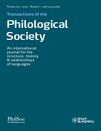
TRANSACTIONS OF THE PHILOLOGICAL SOCIETY
Elevating Academic Discourse in LinguisticsTRANSACTIONS OF THE PHILOLOGICAL SOCIETY, published by Wiley, is a prestigious journal focusing on the fields of linguistics and language studies. With a rich history that spans over 180 years, having been established in 1842, this journal continues to contribute significantly to the academic discourse on language and linguistics. It holds an impressive impact factor and ranks in the Q2 category for both Linguistics and Language in the 2023 category quartiles, underscoring its relevance and scholarly influence, as evidenced by its rankings in the Scopus database. Researchers, professionals, and students will find this journal invaluable for accessing high-quality research articles that illuminate various aspects of language and linguistics. While the journal does not currently offer open access, it remains a vital resource for anyone dedicated to advancing knowledge in these fields. Its address in the United Kingdom underscores its international reach and commitment to academic excellence.
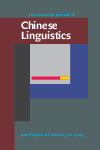
International Journal of Chinese Linguistics
Advancing Knowledge in Chinese Language StudiesInternational Journal of Chinese Linguistics is a distinguished publication that delves into various aspects of linguistic studies pertaining to the Chinese language. Published by John Benjamins Publishing Co, this journal stands out for its commitment to advancing the knowledge and understanding of Chinese linguistics within the global academic community. With an impact factor that places it in the Q2 quartile of linguistics and language, the journal is indexed in prominent databases, achieving ranks of #501 in Arts and Humanities and #580 in Social Sciences. These rankings reflect the journal's dedication to maintaining high scholarly standards and its relevance in both linguistic research and practical applications. While not categorized as Open Access, the journal provides necessary access through institutional subscriptions, thereby ensuring that valuable research reaches a broad audience. Covering a wide range of topics from syntax and phonetics to sociolinguistics and applied linguistics, the International Journal of Chinese Linguistics serves as an essential resource for researchers, professionals, and students seeking to deepen their understanding of the intricate relationship between language and culture in the Chinese context. With converging years from 2019 to 2024, it continues to evolve, reflecting ongoing developments in the field.

Revista Virtual de Estudos da Linguagem-ReVEL
Fostering Global Dialogue in LinguisticsRevista Virtual de Estudos da Linguagem-ReVEL is a prominent academic journal dedicated to the field of linguistics, published by REVISTA VIRTUAL ESTUDOS LINGUAGEM in Brazil. With its ISSN 1678-8931, ReVEL aims to provide a platform for scholarly communication and dissemination of research across diverse areas of language studies, including sociolinguistics, language acquisition, and discourse analysis. As an open-access journal, it fosters accessibility to important linguistic research, allowing researchers, educators, and students alike to engage with the latest findings without subscription barriers. The journal’s focus on innovative methodologies and interdisciplinary approaches makes it a valuable resource for those seeking to deepen their understanding of language dynamics in various contexts. By contributing to the growing body of knowledge in this field, ReVEL plays a crucial role in promoting scholarly dialogue and enhancing the visibility of Brazilian linguistic research on a global scale.

REVUE DE LINGUISTIQUE ROMANE
Connecting Cultures Through Linguistic InsightsREVUE DE LINGUISTIQUE ROMANE, published by the esteemed SOCIÉTÉ LINGUISTIQUE ROMANE, is a prominent academic journal dedicated to the exploration of Romance linguistics. With its ISSN 0035-1458, the journal plays a significant role in advancing knowledge within the fields of linguistics and the history and philosophy of science. Although it does not currently offer Open Access, it provides critical insights and peer-reviewed research that are indispensable for scholars, educators, and students interested in the nuances of Romance languages. The journal, which has seen converged coverage from 2006 to 2017, and then again from 2019 to 2021, is ranked in the third quartile (Q3) across various categories within Scopus, reflecting its established presence in the academic community. As a vital resource for interdisciplinary studies, REVUE DE LINGUISTIQUE ROMANE is instrumental for those seeking to deepen their understanding of linguistic structures, cultural nuances, and the historical development of Romance languages.
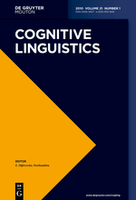
COGNITIVE LINGUISTICS
Innovating Insights at the Intersection of Cognition and Linguistics.COGNITIVE LINGUISTICS, published by De Gruyter Mouton, is a premier academic journal dedicated to advancing the field of cognitive linguistics and its interconnections with psychology and language studies. With an impressive impact factor and a ranking in the Q1 category for Linguistics and Language, as well as Q2 in Developmental and Educational Psychology according to 2023 metrics, this journal demonstrates its significance in fostering scholarly discourse and innovation. The journal's rigorous peer-reviewed approach ensures that only high-quality research is shared with its audience, including professionals, researchers, and students keen on exploring the cognitive aspects of language. Since its inception in 1990, COGNITIVE LINGUISTICS has been a vital platform for disseminating cutting-edge studies, making it an invaluable resource for anyone interested in the intersections of cognitive science and linguistics.
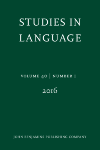
STUDIES IN LANGUAGE
Fostering Dialogue in Linguistics and CommunicationSTUDIES IN LANGUAGE is a distinguished academic journal published by John Benjamins Publishing Co, focusing on the dynamic fields of Linguistics and Communication. With an ISBN of 0378-4177 and E-ISSN 1569-9978, this journal has become an essential platform for researchers, professionals, and students seeking to advance their understanding of language and its multifaceted dimensions. The journal has been recognized in 2023 with a prestigious Q1 categorization in Linguistics and Language and a Q2 ranking in Communication, reflecting its vital contributions to these fields. Its Scopus rankings further emphasize its relevance, ranking 299 out of 1088 in Language and Linguistics, positioning it within the 72nd percentile. Published continuously since its inception in 1977, STUDIES IN LANGUAGE plays a pivotal role in disseminating cutting-edge research and fostering academic dialogue around contemporary linguistic theories and communication practices. While it is not an open-access journal, it offers valuable insights that make it a must-read for anyone committed to exploring the intricate relationships between language, culture, and society.
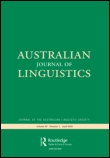
Australian Journal of Linguistics
Shaping the Future of Linguistic InquiryThe Australian Journal of Linguistics, published by Routledge Journals, Taylor & Francis Ltd, stands as a distinguished platform in the field of linguistics, fostering rigorous academic discourse since its inception in 1981. With an ISSN of 0726-8602 and an E-ISSN of 1469-2996, the journal has achieved a notable Q2 ranking in the linguistics and language category for 2023, indicating its quality and relevance within the academic community. With a Scopus ranking of #316 in Arts & Humanities and #373 in Social Sciences, it sits in the 71st and 68th percentiles respectively, underscoring its impact in the fields it encompasses. The journal aims to publish high-quality research articles that contribute to the understanding of linguistic theory, sociolinguistics, and applied linguistics, making it an essential resource for researchers, professionals, and students alike. The journal is based in the United Kingdom, at 2-4 Park Square, Milton Park, Abingdon OX14 4RN, Oxon, England, and actively encourages contributions that can expand the current linguistic discourse, reinforcing its commitment to highlighting diverse perspectives in language research.

Italian Journal of Linguistics
Fostering scholarly discourse in the heart of linguistics.Italian Journal of Linguistics is a prominent academic journal published by PACINI EDITORE, dedicated to advancing the understanding of linguistic theory and application. With its inception in 1996, the journal has fostered scholarly discourse and continues to contribute to the field through rigorous peer-reviewed articles. Operating under the prestigious field of linguistics, the journal currently holds a respectable Q3 quartile ranking as of 2023, showcasing its relevance in the academic community. It also ranks in the top 30% of journals in both Arts and Humanities and Social Sciences disciplines, reflecting its impactful contributions documented in Scopus rankings. While the Italian Journal of Linguistics is not an open-access journal, it offers invaluable insights and innovative research findings, making it an essential resource for researchers, professionals, and students keen on exploring the nuances of language and linguistics. Based in Pisa, Italy, the journal serves as a significant platform for both contemporary studies and classic investigations in linguistics, appealing to an international audience devoted to this ever-evolving field.
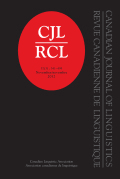
CANADIAN JOURNAL OF LINGUISTICS-REVUE CANADIENNE DE LINGUISTIQUE
Championing rigorous research and innovative theories in linguistics.The Canadian Journal of Linguistics - Revue canadienne de linguistique is a prestigious peer-reviewed publication dedicated to advancing the field of linguistics. Published by Cambridge University Press, this journal has firmly established itself as a vital resource for researchers, professionals, and students alike, offering insights into a diverse range of linguistic studies and theories. With an impressive impact factor reflecting its academic rigor, the journal is ranked Q2 in the categorization of linguistics and language as of 2023, and holds commendable positions in both Scopus ranks for Arts and Humanities as well as Social Sciences. The journal's converged years span from 1996 to 2024, showcasing a rich history of contributions to the discipline. Although it currently does not offer open access, it remains highly influential. Located in Canada, the journal plays a crucial role in fostering scholarly communication within the linguistic community, making it an essential outlet for disseminating groundbreaking research and engaging discussions.
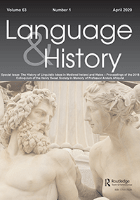
Language & History
Bridging Linguistics and History for Deeper InsightsLanguage & History is a distinguished journal published by Routledge Journals, Taylor & Francis Ltd, focusing on the intersection of linguistics and historical context. With an ISSN of 1759-7536 and an E-ISSN of 1759-7544, this journal serves as a vital platform for scholars exploring the dynamic relationship between language evolution and historical narratives. It is recognized for its contributions to the field, holding a Q2 ranking in Linguistics and Language for 2023, reflecting its esteemed position among peer publications. Indexed in Scopus with notable rankings in both Arts and Humanities and Social Sciences, Language & History aims to foster innovative research, shed light on language change, and encourage cross-disciplinary dialogue. The journal operates without open access, providing rigorous peer-reviewed content for researchers, professionals, and students alike, ensuring that cutting-edge studies remain at the forefront of linguistic research. Published biannually, it continues to attract a diverse array of contributions that enrich the understanding of language within historical contexts, making it an essential resource in the academic community.